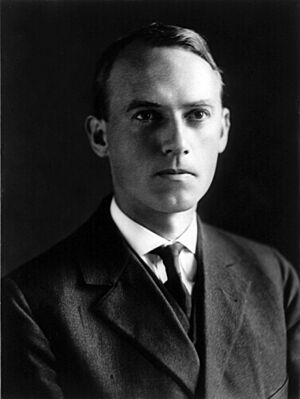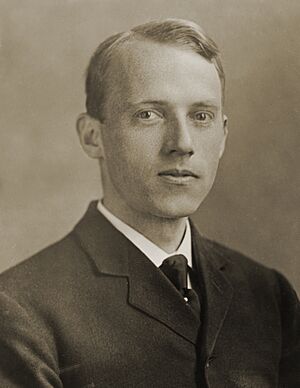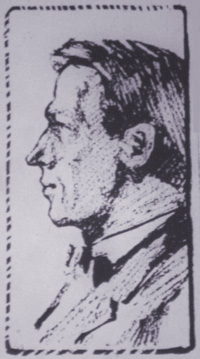Scott Nearing facts for kids
Quick facts for kids
Scott Nearing
|
|
|---|---|

Nearing in 1915
|
|
| Born | August 6, 1883 Morris Run, Pennsylvania, U.S.
|
| Died | August 24, 1983 (aged 100) Harborside, Maine, U.S.
|
| Nationality | American |
| Education | PhD in Economics (1909) |
| Alma mater | University of Pennsylvania |
| Occupation | radical economist, educator, and writer |
| Years active | 1905–1982 |
| Known for | political activist, author, and advocate of simple living |
| Movement | Socialism, Communism |
| Spouse(s) | Nellie Marguerite Seeds Nearing; Helen Nearing |
| Children | 2, including John Scott |
Scott Nearing (born August 6, 1883 – died August 24, 1983) was an American economist, teacher, and writer. He was known for his strong beliefs in simple living, being a pacifist (someone who believes in peace and is against war), and a vegetarian. He also spent his life working as a political activist, trying to make society fairer.
Contents
Scott Nearing's Life Story
Growing Up and Early Education
Scott Nearing was born in Morris Run, Tioga County, Pennsylvania, a place known for coal mining. His grandfather was a mining engineer and a very driven person who loved science, nature, and books. Scott grew up in a comfortable home, with his family having help from tutors and servants. People in his hometown looked up to him because he was smart and handsome.
Scott's father was a businessman, and his mother taught him to appreciate nature, books, and art. Even though he had a privileged upbringing, Scott cared deeply about social problems. He wanted to help people and make the world better.
After high school in 1901, Scott first tried law school but found it didn't fit his ideals. Instead, he studied economics at the Wharton School at the University of Pennsylvania. He was greatly influenced by his teacher, Simon Nelson Patten, who encouraged new ways of thinking about economics and social change. Scott quickly finished his degree in three years, while also getting involved in campus politics and debates. He earned his PhD in economics in 1909.
From 1905 to 1907, Scott worked to stop child labor in Pennsylvania. From 1908 to 1915, he taught economics and sociology at the Wharton School and Swarthmore College. He wrote many books about economics and social issues. He believed that economists should help people understand how to make society better, rather than just accepting problems like poverty.
Scott thought that too much wealth in the hands of a few people could stop progress. He hoped that rich people would realize this and help lead society in a better way. He believed in a fair economic system based on equal chances, civic duty, and human rights.
While living in Arden in 1910, Nearing learned about The Landlord's Game, which was the first version of the game Monopoly. He taught it to his students, which helped the game spread to other colleges.
Standing Up for His Beliefs
Scott's strong opinions in his classes and writings caused problems with the leaders of the University of Pennsylvania. In 1915, he was fired. This event became very famous as a fight for "academic freedom"—the right of teachers to express their ideas without fear of losing their jobs. Many people, including other professors and even some who disagreed with him, were upset by his dismissal. They felt it was wrong to fire a professor for his views.
Socialist writer Upton Sinclair told Nearing that he belonged with activists, not in a university. He said Nearing could reach more people outside of college.
During World War I
After being fired, Scott became a well-known public speaker and activist. He joined the American Union Against Militarism in 1916 and spoke out against war. He also taught at Toledo University from 1915 to 1917. However, when the United States joined World War I, his anti-war views led to him being fired from Toledo University as well.
Scott then moved to New York City and helped start the People's Council of America for Democracy and Peace, a group that wanted peace. In 1917, he joined the Socialist Party and began teaching at the Socialist Party's Rand School of Social Science.
He gave many speeches and wrote pamphlets against the war. One pamphlet, The Great Madness, led to him being charged under the Espionage Act. This law made it illegal to interfere with military recruitment. His trial happened in 1919, after the war ended.
During the trial, Scott argued that he had a right to express his opinions, even if they were unpopular. He said that free discussion is important for democracy. The jury found him not guilty, but the organization that published his pamphlet was fined.
From Socialism to Communism
After World War I, the Socialist Party of America faced challenges, and many members left to form Communist groups. Scott Nearing stayed with the Socialist Party for a while, but he saw that it was losing members. He started to think about what a "radical" person should do. He believed a radical should be an outside critic, not part of the established system.
In 1924, Nearing applied to join the Workers Party of America (which later became the Communist Party). He was first rejected but joined in 1927. He worked for their newspaper, The Daily Worker, for a short time. He left in 1930 because his ideas about imperialism didn't match the party's views, and he was formally expelled.
In 1925, Scott visited the Soviet Union to study their education system. He wrote a book about it called Education in Soviet Russia. In 1927, he traveled to China and saw the conflict there. He wrote Whither China? about his experiences.
Scott remained an important voice on the American Left throughout the 1920s, writing many pamphlets and giving lectures.
Living Simply During the Great Depression
Scott Nearing and his first wife, Nellie, had two sons. Later, Scott became a vegetarian at age 35. In the 1930s and 1940s, Scott and Helen Knothe, who was also a lifelong vegetarian, moved to rural Vermont. They bought a large piece of land and a farm. They wanted to live a simple, self-reliant life, growing most of their own food. They even built nine stone buildings over twenty years. They earned some money by making maple syrup and maple sugar from their trees, and from Scott's occasional lectures.
While they worked very hard, their simple life was also supported by money Helen inherited and money Scott received from his father.
Scott wrote and published many small books on topics like peace, women's rights, and environmental issues.
World War II and Beyond
Scott Nearing was always against war. He opposed the United States joining World War II. In 1943, he was fired from a news service because of his anti-war views. He was especially shocked by the atomic bombings of Japan in 1945, writing to President Harry S. Truman that his government was "no longer mine."
In 1952, the Nearings moved from Vermont to Brooksville, Maine. Their land in Vermont had become very valuable because a ski area was built nearby. They decided they hadn't done anything to earn this extra value, so they gave the land to the town of Stratton to be used as a forest.
In 1954, Scott and Helen wrote Living the Good Life: How to Live Simply and Sanely in a Troubled World. This book described their nineteen-year experiment in living off the land and promoted modern "homesteading" and vegan organic gardening (growing food without using any animal products).
They traveled the world, visiting countries in Europe, Asia, and the Soviet Union, and wrote books about their experiences, like Socialists Around the World and The Brave New World. They described the Soviet Union and China as "peaceful socialist giants," believing these countries wanted peace because they were focused on building their societies.
Later Years and Legacy
During the Vietnam War in the 1960s, many young people became interested in Scott Nearing's ideas about simple living and his anti-war message. Hundreds visited his home in Maine to learn about homesteading.
In 1968, Nearing signed a pledge to refuse to pay taxes as a protest against the Vietnam War.
In 1973, the University of Pennsylvania, which had fired him in 1915, gave him the title of Honorary Emeritus Professor of Economics. This was a way of recognizing his contributions.
Scott Nearing even appeared in the 1981 film Reds, sharing stories about his friend John Reed and the time leading up to the Russian Revolution.
Vegetarianism
Scott Nearing became a vegetarian in 1917. He was a vice president of the International Vegetarian Union and often spoke at their conferences around the world. He believed that life was important for all creatures and that he didn't need to eat animals to be healthy. He and Helen used no animal products, like manure, in their gardens because they were against the "slaughter business." In 1991, both Scott and Helen Nearing were added to the Vegetarian Hall of Fame.
Understanding World Events
Scott Nearing spent 70 years studying and traveling to understand world affairs. He wanted to share his findings with others. He wrote for news services that provided information to labor and activist newspapers. He also wrote a regular column called "World Events" for the Monthly Review magazine, where he shared his thoughts on society and the movement towards a socialist world. He continued this work until he was 87 years old.
His Final Years
As he got older, Scott Nearing's health began to decline. A month before his 100th birthday, he decided to stop eating food. He drank fruit juices for a while, then only water. Scott Nearing died on August 24, 1983, in his home in Harborside, Maine, just eighteen days after his 100th birthday. His wife, Helen, was with him. His ashes were spread over his farm.
Scott Nearing's Ideas
Scott Nearing called himself a pacifist, a socialist, and a vegetarian. He believed that no person had the right to harm another, even in social struggles. He said he became a vegetarian because he felt that all living things have a right to life.
He was greatly influenced by Leo Tolstoy, his teacher Simon Nelson Patten, his grandfather, and his mother. Other thinkers who inspired him included Socrates, Gautama Buddha, Mahatma Gandhi, Jesus, and Henry David Thoreau.
Scott Nearing's life showed a journey of realizing that powerful groups in society often resist change. He learned that simply trying to reform the system from within might not be enough. This led him to choose "homesteading"—living a self-sufficient life on his own land. He gradually moved away from traditional society, including organized religion and mainstream politics.
He saw his choice to live in the wilderness as a way to build a new, better way of life that challenged the capitalist system. Like famous American thinkers Emerson and Thoreau, Nearing believed in being self-reliant and living by his own conscience.
Scott Nearing believed that when an individual disagrees with a group, there are only a few outcomes: the individual wins and leads the group, the group splits into fighting sides, or the group forces the individual to conform. He chose his simple, self-sufficient life as a way to avoid these conflicts, while still caring deeply about society and the world.
The poet Allen Ginsberg called Nearing a "grand old man, a real mensch" (a Yiddish word meaning a person of integrity and honor).
Books by Scott Nearing
Scott Nearing wrote many books and pamphlets throughout his long life, sharing his ideas on economics, social issues, peace, and simple living. Here are some of his notable works:
- Social Adjustment (1911)
- The Solution of the Child Labor Problem (1911)
- Wages in the United States, 1908–1910 (1911)
- Woman and Social Progress (with Nellie M. S. Nearing) (1912)
- Reducing the Cost of Living (1914)
- The New Education (1915)
- Poverty and Riches (1916)
- The Great Madness: A Victory for the American Plutocracy (1917)
- The American Empire (1921)
- Education in Soviet Russia (1926)
- Dollar Diplomacy (with Joseph Freeman) (1925)
- The British General Strike (1927)
- Black America (1929)
- The Twighlight of Empire (1930)
- War: Organized Destruction and Mass Murder by Civilized Nations (1931)
- The Maple Sugar Book (with Helen Nearing) (1950)
- Man's Search for the Good Life (1954)
- USA Today (with Helen Nearing) (1955)
- Socialists Around the World (with Helen Nearing) (1958)
- The Brave New World (with Helen Nearing) (1958)
- The Conscience of a Radical (1965)
- Living the Good Life: How to Live Sanely and Simply in a Troubled World (1970)
- The Making of a Radical: A Political Autobiography (1972)
- Continuing the Good Life: Half a Century of Homesteading (1979)



